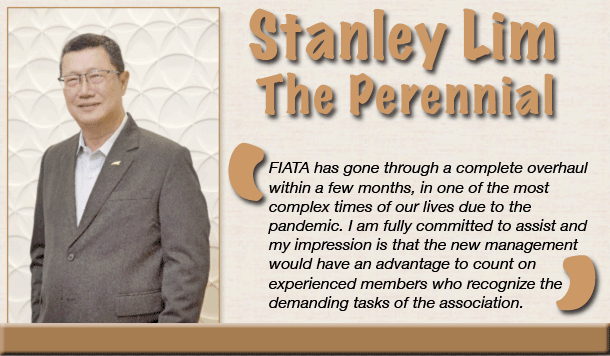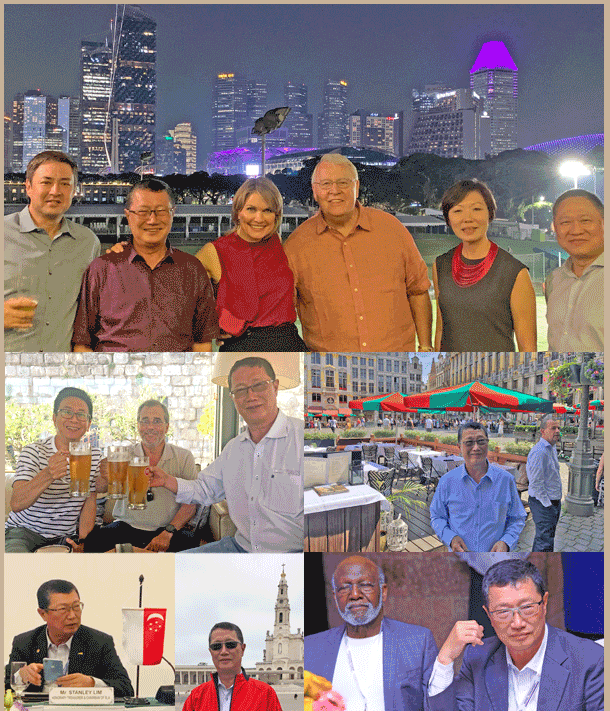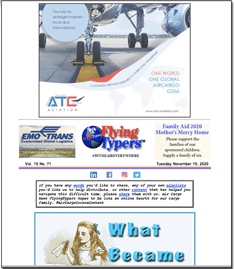 |
During the National Day Awards on of August
9th, 2020, the BBM – The Public Service Star (Bar) Bintang Bakti
Masyarakat (Lintang) - was bestowed upon Mr. Stanley Lim (STANLEY LIM
PBM, BBM, MCILT) by the President of the Republic of Singapore. In Singapore,
Stanley is the Council Member of the Singapore Logistics Association and
Chairman of Internationalization. He is the Hon. Secretary of the ASEAN
Federation of Forwarders Associations, as well as Director, Global Agency
Development, in Addicon Logistics Management (S) Pte Ltd. Stanley has
also been my first FIATA President, when I was working in Zurich.
When I took office as DG at the end of 2011,
he had just been elected: a debut for both of us. Stanley was still President
when he opened the FIATA World Congress in Singapore in 2013. If you were
there, you would not have missed him: he was here, there and everywhere
more than anyone else, despite his many tasks as outgoing President of
FIATA: a real force of nature.
Let me now explain why I have called Stanley
“perennial”. Stanley was born on March 9th, 1948 in Singapore
in a Chinese Buddhist family, at a perfect time to witness the gradual,
steady pace of Singapore toward independence under British colonial rule,
which was concluded in 1963 as Malaysia, subsequently in 1965 as Singapore
Nation. Stanley has been involved with shipping, Logistics and Customs
in Singapore for his entire life, the best part of it spent in the Singapore
Logistics Association. He is the longest serving Council Member in the
association he headed from 1992 to 2006. He was then called back to the
helm of SLA between 2014 and 2018, after the sudden and sad passing of
his successor.
Generations of Service Lifted FIATA
Stanley, in fact, has been working for a
time covering two generations and he shows the stamina to continue, without
a drop of sweat.
Stanley Lim attended the FIATA World Congresses
in 1989, 1990 and 1991, he then was elected to chair the Region Asia Pacific
for ten years. We are talking of times when FIATA was struggling with
the reputation of being too Eurocentric; surely Stanley at the helm of
RAP contributed to dispelling the idea. In 2001 Stanley was elected Senior
Vice President in Cancun, i.e. the stepping stone for the next leap into
the President’s role. Stanley said he “won by 4 votes just
after 9/11...” i.e. he considers this election slightly fortuitous.
What I have to say is that Stanley is a lucky man indeed, yet he is able
to live up to his fates, unlike others. Once elected he will do anything
to show he is worth the position, doing all that is required by protocol
and circumstances. Over the many years I never noticed Stanley to be tired,
even when others were just about to exhale their last puff, including
the undersigned.
Young Forwarder Dreams
I then asked Stanley what share does FIATA
have in realizing his dreams as a young freight forwarder: “FIATA
is international and as Chairman of SLA for 14 years in FIATA’s
attendance I was given the opportunity to promote Singapore internationally.
Watching the transformation from Customs to logistics and timely adapting
to it, this global link was precious. UN bodies and the WCO were valuable
access to important information on behalf of the Singapore Association.
In return I was given many opportunities by FIATA, I served in the Presidency
as Senior Vice President between 2001 and 2007 and was then elected Treasurer
for two terms between 2007 and 2011.”
Then Stanley modestly stopped talking. At the
2011 FIATA World Congress in Cairo, Egypt Stanley Lim was elected President.
Metaphyics from an Urn
In Egypt the air was charged with electricity.
It was not going to be usual: manoeuvres to be elected culminating with
the ovation at the AGM. For the first time in years a real ballot between
two thoroughbred candidates was taking place: a tug of war between the
former Treasurer Sarosh Nagarvala, the shining personality who had transformed
the AFI meetings into pure entertainment and the present-day Treasurer,
Stanley Lim, the unsurpassed auctioneer who would steer the Gala Dinner
Charity Tombola, the only person I know who can extract pure metaphysics
from shouting the numbers extracted from the urn. I asked Stanley about
his passion for the lottery. He said he was happy to help the FIATA Foundation,
in order to help FIATA Association Members to kick start their training
programmes. The FIATA Foundation needs the funding to keep this going,
he said. I am sure Stanley enjoys feeling that he is useful, but I still
suspect he just likes the lottery, too.
FIATA Reset during Pandemic
In our recent conversation, Stanley told
me that “a lot is happening in FIATA: the reset idea is very good,
but there are issues. FIATA has gone through a complete overhaul within
a few months, in one of the most complex times of our lives due to the
pandemic. I am fully committed to assist and my impression is that the
new management would have an advantage to count on experienced members
who recognize the demanding tasks of the association.”
The China Card
I then asked Stanley a personal question:
“As Singaporean, was it easy to act as diplomat between China and
Taiwan in arranging for the Taipei World Congress?” His reply was
the epitome of diplomacy: “Singapore always being neutral, we go
for both sides on politically sensitive issues: we do not get involved
into politics and it is business only; and that is the place for NGO’s.
Chinese Taipei is a member in FIATA, which is an NGO working with other
NGO’s as well as UN bodies, the WTO, the WCO and others. In fact
the participation from mainland China in Taipei was quite conspicuous
and it was really well received by the organizers in Taipei. The late
Peter Yang was very helpful, a real gentleman.”
For the record, Huxiang Zhao, nominated
by the Chinese Federation, was elected President of FIATA in Taipei in
2015 and everyone rejoiced in a heartfelt celebration.
FIATA World Congress
Stanley is still on the FIATA Extended Board
and is Board Council Member in the FIATA Foundation, but his most demanding
task today is chairing the FIATA World Congress Committee.
This is the role that I asked Stanley to
explain in greater detail, in particular with regard to the issues created
by the pandemic: “There have been incredible challenges due to COVID19:
there was a very delicate situation as I have had to explain the challenges
to our Korean friends, I mean the challenge of a Congress with no delegates
going to congress . . . South Korea was doing relatively well in the springtime,
but the rest of the world? Who would venture to come to congress? Our
local association had to explain this to the Korean government, to justify
the postponement until 2022. They explained that 2021 was still at risk,
but 2022 was relatively safer. As Chair of the Committee I had to raise
our concerns to Brussels (FWC2021) that they should be careful with force
majeure clauses in their contracts.
The bidding process for the FIATA World
Congress is tough and compliance is complex. The Congress Protocol has
been updated several times and will be updated again, but the congress
is a pretty sizeable endeavour. Bidders must realize what they are getting
into, especially on financial obligations.”
The Stanley Lim Embrace
My next question was then almost inevitable:
“What is Stanley’s lesson learnt after the coronavirus outbreak?”
His reply left no space for doubt: “I learnt that we must embrace
technology and the early birds have a competitive advantage. Technology
will assist if you keep innovating, otherwise you will be left behind.
We must adopt technology to the fullest and fight for new technology.
For example I am doing my training via Zoom today.”
 |
A Half Century of Service to Transportation
“Mr. Lim’s illustrious 50 years’
career in the logistics industry began after serving two years in the
Singapore Customs.” This comes from Stanley’s bio and I wanted
to investigate a bit more to understand how the seed planted in his heart
as a young Singaporean grew to make his international personality flourish.
My friend told me that he was sent as a pupil to the St.
Joseph Catholic Mission School.
La Salle Brothers are one of the main training
missions within the Catholic church and a very powerful organization worldwide.
Then Stanley added “After St. Joseph I had to find a job to support
the family and I started to work for Customs. I left two years later,
after a good career involved in making a lot of recoveries, ensuring conspicuous
revenues to the state. The probation period was three years then, and
that was too long for me. I thought I should use my talents in logistics,
when Singapore was becoming a transhipment hub for American and international
enterprises, petroleum industry, pipes and drilling and the like. I was
one of the pioneers then. With my established connections, I was employed
by a freight forwarder called Jacky’s Transport, where I worked
for 10 years. Having accumulated more experience, I moved to Birkart,
a German-based company, where I learnt a new trade: hanging garments transport
. . . I had the opportunity to come to Europe and visit Aschaffenburg
many times. In my 10 years with Birkart I had become a global player.
I was teaching the regional agents who were handling C&A cargo (hanging
garments) the “Birkart shipment” way, as we had our own equipment
constructed inside the container. I went to teach our modus operandi in
Sri Lanka, Bangladesh etc. so that pre-hung garments could be shipped
to Germany and easily moved straight into the shops.
“Ten years later, I started my own
company: Conterm Freight, as agents working with a Swedish affiliate of
Greenship, CONMEL Group, which lasted another ten years before being sold
to Vanguard Logistics (NACA Group), in which I served my three years’
non-competition due diligence.
“When I was free from my duties, the owner
of Addicon, who is related to me, asked to accept the task to lead the
global agency development (China, Singapore HQ, Vietnam, Cambodia), because
of my experience and contacts.”
Stanley also goes Pro Bono
That is today’s chore for the young 72-year
old also known as the perennial, who does not begrudge accepting pro bono
assignments from time to time. On behalf of SLA, Stanley Lim is the Hon.
Secretary of the ASEAN Federation of Forwarders Associations, leads the
GeTS Trade Connectivity project for ASEAN 10 Trade connectivity and beyond.
Besides all these other initiatives, training has been Mr. Lim’s
true passion. He was a pioneer in the 80’s in developing training
programmes for freight and logistics personnel. In 1990, 1991, 1996 and
2000, Stanley was the Resource Trainer for UN ESCAP as well as the Trainer
at the Dalian Maritime University in 1996 and 2000. Back home, Stanley
has been active for twenty years teaching Customs officials. In recognition
of his valuable contributions, the President of the Republic of Singapore
bestowed the Public Service Award upon him in 2001; then came the Golden
Chariot Award in 2016 and the Supply Chain Asia award for Most Inspiring
Supply Chain Professional in 2014 and Honorary Fellow in 2018.
One last thing to Share
In awe at the details of such a career, I asked
Stanley whether he had any special story for the FlyingTypers
readers. He said that he had learnt in the last five years that low cost
carriers are important just regionally for up to 4-5 hour flight distances.
“We can land-air transport from areas such
as Cambodia to Vietnam and Thailand (especially garments). So the importance
of intermodal solution is growing, in particular in this period when capacity
cannot be taken for granted. Yet, the challenge is the capacity, as it
is in other areas, but here more than in other areas. With COVID-19, it
is even tighter, so transformation to enhanced technology and additional
flexibility will be key to success in the near future.”
The Perennial was born in 1948, the year of the
Rat and you may not forget that the Rat was the first to get to the Jade
Emperor in the Chinese Zodiac. Considering his prodigious energy and accumulated
knowledge, my feeling is that the Rat may also be the last to go.
Thank you, Stanley for your smile and wisdom.
Marco L. Sorgetti
Turin, Italy |



